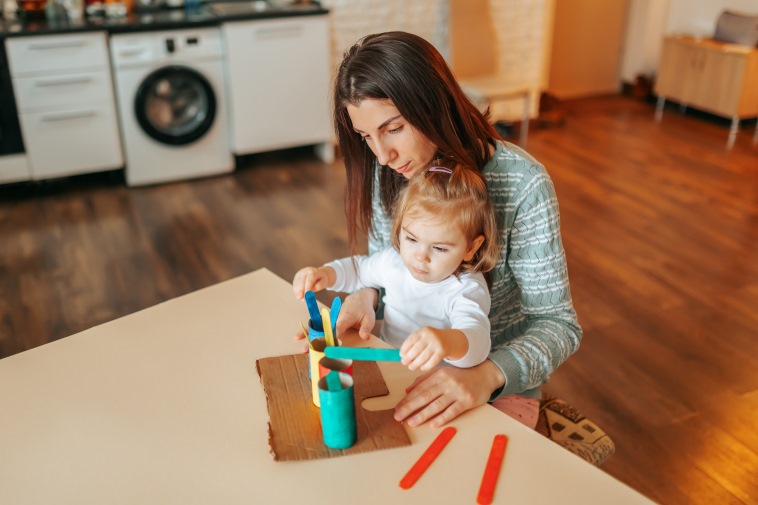Parenting Skills and Practices

The relationship between children and their parents has a great influence on most spheres of child development. Optimized, parenting skills, behaviors, and practices positively influence the child's self-esteem, school success, cognitive development, and behavior.
What is its importance?
There is a strong consensus on the importance of the role of parents in the way their children develop and function. Many of a child's abilities depend fundamentally on their interactions with their caregivers and with their wider social environment. In fact, among the risk factors involved in the development of behavioral and affective problems in children, the quality of parenting practices is the most important among those that can be modified.
Parent-child interactions have an influence on several areas of development, such as self-esteem, school achievement, cognitive development, and behavior. However, the vast majority of parents do not use the most appropriate parenting practices.
What do we know?
The Effects of Parenting Practices
To ensure the best possible outcomes for their children, parents must find a balance between their demands with regard to the child's maturity and the discipline necessary for their integration into the family and social system, as well as for maintaining an environment of affection, listening and support. When parents' behavior and attitude do not reflect this balance of characteristics during the preschool period, children may face a range of adjustment and adjustment problems.
Several studies have established a relationship between sensitive and responsive parenting practices and the child's manifestation of positive emotions; On the other hand, negative, irritable, or aggressive children would have been subjected to less favorable parenting practices and even problematic practices. More specifically, the researchers linked the onset of conduct problems in children to either inconsistent, rigid, explosive or irritable discipline, or insufficient supervision and effort.
Parental responsiveness is also important for cognitive development. Studies have shown that cognitively sensitive behaviors – for example, supporting interests rather than redirecting them, and offering the child rich verbal input – give the child a framework for developing attentional and language skills. In addition, early and consistent participation in learning activities, and providing the child with age-appropriate learning materials favor learning and, more specifically, language development. In addition to providing a great learning context, all these parenting practices encourage the child to play a more active role in their learning process and to develop a positive attitude towards learning.
In the case of children living in poverty, in addition to parenting practices, other factors related to the social environment have repercussions on their subsequent functioning, in particular age, well-being and history of antisocial behavior of parents, social support in the immediate family and outside it, as well as neighborhood characteristics.
Determinants of parenting practices
What drives parents to raise their children in a certain way and not another? Several personal and social factors come into play.
The socio-contextual factors that shape parenting practices encompass the child's characteristics, the history of the parents' development and their own psychological characteristics, personal and marital distress, social isolation, and the broader social context in which the parents and their relationships are inserted. Parents' personality characteristics also play a role, influencing their emotions and/or perceptions, including their understanding of the factors underlying their children's behavior.
Research shows that language stimulation and the presence of learning material at home are the parenting practices most strongly linked to school readiness, vocabulary and achievement in the early school years, whereas parental disciplinary strategies and educational practices are most strongly associated with social and emotional outcomes, such as behaviour, control of impulsivity and attention.
Knowledge of parenting practices also plays a key role. When parents know the norms and stages of development and know how to care for their children, they enjoy a global understanding that allows them to adapt or anticipate changes in child development. Studies show that mothers who know better about the development of the baby and child have better parenting skills.

Similarly, when parents have wrong beliefs or overestimate their child's performance, they can actually undermine that performance, probably because parents' expectations can have an effect on their behaviors.
What can be done?
There are many support programmes for parents that aim to support and strengthen parenting skills and promote the development of new skills. The ways in which these parent support programs intervene vary, but the goal remains the same: to improve the lives of children and their parents. The strategy is also common to all of them: to have an impact on children through changes in parents' attitudes, knowledge and behaviours. These programs aim to provide parents with the knowledge and skills they need to effectively fulfill their responsibilities in raising their children and to provide them with experiences and opportunities that support learning and development. Many of these programs are community-based initiatives aimed at providing resources and different forms of support to parents.
Successful parenting support programs focus on specific childhood behaviors (e.g., developmental disabilities or conduct problems) or specific developmental transitions. They address several factors, such as consistency of care in other settings (in preschool or daycare) and maternal well-being. These programs devote immense efforts to the initial training of the teams that implement the programs with the parents and also to maintaining the quality of the intervention over time. Finally, they maximize parental investment by highlighting the importance of young children's development and making the relationship between parenting skills and healthy decisions.
These successful programs provide parents with the opportunity to come together and offer mutual support. The data are particularly consistent for programs that combine parent support interventions and educational services directly to the child, both of which contribute to better child outcomes.
Research on parenting practices and support programs should take into account four trends: it is necessary to specify parenting skills inside and outside the home (e.g., the importance of interpreting events, establishing a routine, being aware of outside resources); specify outcomes for children or parents (and determine which processes are linked to which effects); find ways to integrate children into the context more fully (i.e., take into account their opinion of what it means to be a good parent); and to pay greater attention to cultural differences in the way parents think, act or feel. Therefore, research on parent-child interactions should be continued to assess outcomes across a wide variety of ethnic, racial, cultural, and socioeconomic groups.
